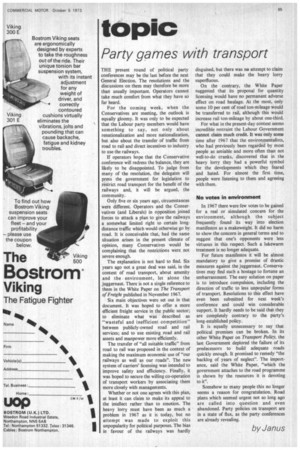topic
Page 87

If you've noticed an error in this article please click here to report it so we can fix it.
Party games with transport
THE present round of political party conferences may be the last before the next General Election. The resolutions and the discussions on them may therefore be more than usually important. Operators cannot take much comfort from what they have so far heard.
For the coming week, when the Conservatives are meeting, the outlook is equally gloomy. It was only to be expected that the Labour party members would have something to say, not only about renationalization and more nationalization, but also about the transfer of traffic from road to rail and direct incentives to industry to use the railways.
If operators hope that the Conservative conference will redress the balance, they are likely to be disappointed. To judge from many of the resolution, the delegates will press the government for legislation to restrict road transport for the benefit of the railways and, it will be argued, the community.
Only five or six years ago, circumstances were different. Operators and the Conservatives (and Liberals) in opposition joined forces to attack a plan to give the railways a somewhat limited right to certain longdistance traffic which would otherwise go by road. It is conceivable that, had the same situation arisen in the present climate of opinion, many Conservatives would be complaining that the restrictions were not severe enough.
The explanation is not hard to find. Six years ago not a great deal was said, in the context of road transport, about amenity and the environment, let alone the juggernaut. There is not a single reference to them in the White Paper on The Transport of Freight published in November 1967.
Six main objectives were set out in that document. It was hoped to offer a more efficient freight service in the public sector; to eliminate what was described as "wasteful and inefficient competition" between publicly-owned road and rail services; and to use existing road and rail assets and manpower more efficiently.
The transfer of "all suitable traffic" from road to rail was proposed in the context of making the maximum economic use of "our railways as well as our roads". The new system of carriers' licensing was intended to improve safety and efficiency. Finally, it was hoped to secure the willing co-operation of transport workers by associating them more closely with managements.
Whether or not one agrees with this plan, at least it can claim to make its appeal to the intellect rather than to emotion. The heavy lorry must have been as much a problem in 1967 as it is today, but no attempt was made to exploit this unpopularity for political purposes. The bias in favour of the railways was hardly disguised, but there was no attempt to claim that they could make the heavy lorry superfluous.
On the contrary, the White Paper suggested that its proposal for quantity licensing would have no permanent adverse effect on road haulage. At the most, only some 10 per cent of road ton-mileage would be transferred to rail, although this would increase rail ton-mileage by about one-third.
For what in the present-day context seems , incredible restraint the Labour Government cannot claim much credit. It was only some time after 1967 that the environmentalists, who had previously been regarded by most people as amiable and more often than not well-to-do cranks, discovered that in the heavy lorry they had a powerful symbol for the developments which they feared and hated. For almost the first time, people were listening to them and agreeing with them.
No votes in environment In 1967 there were few votes to be gained for a real or simulated concern for the environment, although the subject frequently found its way into election manifestos as a makeweight. It did no harm to show the concern in general terms and to suggest that one's opponents were less virtuous in this respect. Such a lukewarm treatment is no longer adequate.
For future manifestos it will be almost mandatory to give a promise of drastic measures against the juggernaut. Conservatives may find such a hostage to fortune an embarrassment. The easy solution on paper is to introduce compulsion, including the direction of traffic to less unpopular forms of transport. Resolutions to this effect have even been submitted for next week's conference and could win considerable support. It hardly needs to be said that they are completely contrary to the party's long-established policy.
It is equally unnecessary to say that political promises can be broken. In its other White Paper on Transport Policy, the last Government deplored the failure of its predecessors to build adequate roads quickly enough. It promised to remedy "the backlog of years of neglect". The importance, said the White Paper, "which the government attaches to the road programme is shown by the resources it is devoting to it".
Somehow to many people this no longer seems a reason for congratulation. Road plans which seemed urgent not so long ago are called into question and even abandoned. Party policies on transport are in a state of flux, as the party conferences are already revealing.
by Janus
















































































































































